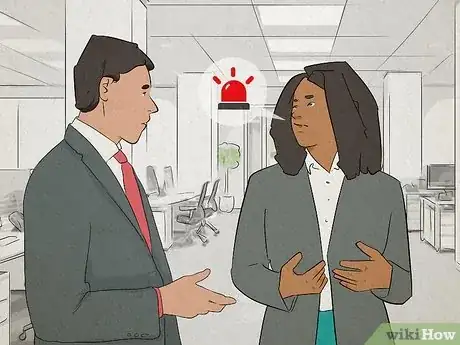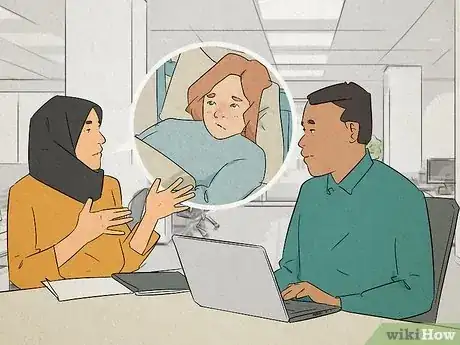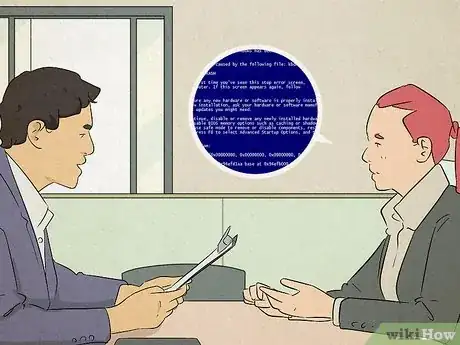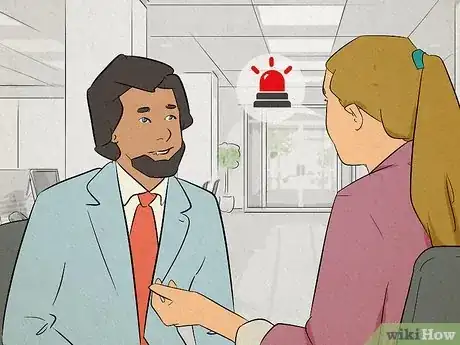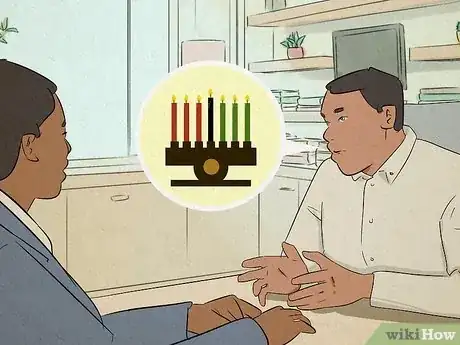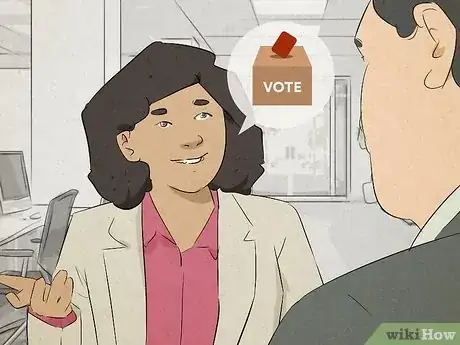This article was co-authored by wikiHow staff writer, Hunter Rising. Hunter Rising is a wikiHow Staff Writer based in Los Angeles. He has more than three years of experience writing for and working with wikiHow. Hunter holds a BFA in Entertainment Design from the University of Wisconsin - Stout and a Minor in English Writing.
There are 13 references cited in this article, which can be found at the bottom of the page.
This article has been viewed 7,073 times.
Learn more...
Had a long, tiring morning filled with meetings? Maybe you’re just feeling out of it and not getting anything done at work. If so, it might be time to use an excuse to get off early. Sure, you shouldn’t use these excuses all the time, but it doesn’t hurt to use one here and there when you need a breather. Keep reading to find some of the best reasonable excuses to use so you can have a little R&R from your job.
Things You Should Know
- Tell your boss you have a pounding headache, a fever, or stomach issues and need to head home early.
- Claim your security alarm was triggered or that there's another issue at home you need to deal with (gas leak, burst pipe, etc).
- Say you have a personal emergency you need to deal with.
Steps
Cough or fever
-
Your boss won’t want to risk your coworkers getting sick. A smart boss will know that a nasty cough, sinus congestion, or fever is often a sign of a contagious disease and should be reason enough to go home earlier.[1] X Research source
- Especially since the start of the Covid-19 pandemic, many employers know it could be dangerous to keep sick employees in the workplace.
Pounding headache
-
A headache makes it harder to focus on your job and do it well. A severe headache is completely debilitating, and exposure to light and noise can make it worse. Your boss will think you can’t work to your full potential and may let you leave early so you can recover for the next day.
- Migraines are a particularly good excuse because they often occur with little warning, and people who suffer from them can have acute episodes up to several times a month.[2] X Trustworthy Source Cleveland Clinic Educational website from one of the world's leading hospitals Go to source
Severe stomach issues
-
Constant trips to the bathroom are very distracting. If you’re not in good health, you can’t do your job effectively anyway, and employers have little reason to force you to stay. Stomach pain or devastating menstrual cramps are also common symptoms you could mention that are preventing you from working effectively.
- You don’t need to mention a lot of symptoms, but be sure to follow your company’s sick policy when you’re informing your supervisor. If you’re using sickness as an excuse to get out of work early, do it in a timely manner and follow the proper protocol from your employment contract.[3] X Research source
Medical appointment
-
Visiting a doctor can require taking time off. It’s often hard to get an appointment at the doctor, dentist, or optician’s office outside of work hours, and most employers will understand that. Since you can’t always control what time you’re scheduled, tell your supervisor that you have an appointment coming up and that you need to leave early for it.[4] X Research source
- If your job requests a doctor’s note or other documentation, this may not be the best excuse to use.
- Unless the appointment is for a sudden medical issue, this excuse works best if you give advance notice. If you don’t let your boss know about the date of the appointment ahead of time, they are more likely to be annoyed and suspicious.
Vague personal emergency
-
Your boss won’t pry for reasons if they know you’re distressed. Sometimes, things come up that you can't easily explain or aren’t appropriate to tell your boss, such as the fallout from a messy relationship or an embarrassing health issue. While it’s better to have a detailed reason to leave work, most supervisors will not pry too deeply into your personal life if you tell them there are private circumstances you need to take care of.[5] X Research source
- Using this excuse too often could make your supervisor frustrated and make you seem unreliable, so don’t overdo it.
Seriously ill child
-
Caring for kids is more important than a missed meeting. If you have children, your boss may be more lenient about when you leave if they think you need to take them to the hospital or pick them up from an unexpected situation. Especially for single parents, bosses will understand there are some circumstances where your kids come first and make an exception for you heading out early.
- Since kids get sick pretty often, your employer might expect you to develop a plan for managing them that doesn’t include missing work if you use this excuse frequently.[6] X Research source
Loved one in crisis
-
Your boss will know your family comes before work. Tell your boss that an emergency came up with your partner or another family member, such as a mental health crisis or a car accident. Since your boss will know that you’ll only worry the longer you stay at work, they will usually ask if you want to head out early and make sure everything is okay.
- Your boss may be more likely to let you step out if you’re a model employee that never really skips or takes off work.
Close friend in the hospital
-
Your boss may let you leave if a friend is in need. Rather than saying that a family member has an emergency, you could make an excuse that your best friend has had an accident. Since your boss knows work is the last thing on your mind during a crisis, they’re likely to understand and support you leaving early to console and take care of your friend in the case of a sudden emergency.
Death in the family
-
Your boss will usually let you leave so you can grieve. Alert your boss that a loved one has passed away if you need a little bit of time off. Since most people need time to mourn or make funeral arrangements, your boss will usually let you miss a day or two so you can come back ready to work and focused.[7] X Research source
- Be careful with overusing this excuse. Your employer won’t believe you if 5 grandparents pass away in 3 months.
- Some companies have bereavement policies and are required to give you time off if there’s a death in the family.
Broken computer
-
You can’t complete your duties if your machine is down. If you need a computer or other special device for work, a hard drive crash, wifi problem or another technical issue will render you unable to contribute. Let your boss know that you’re having issues and don’t know when it will be fixed, and they might let you call it quits earlier in the day.
- Employers will expect you to find a solution as quickly as possible, so don’t take too much time off or your boss will think you’re lying or see you as unreliable.
- While many offices have IT crews available to fix computer problems, they’re great excuses if you work remotely online.
Car troubles
-
Claiming that your vehicle needs repairs works if you need it for your job. If you use your car for your job or to get to work, tell your boss that you had unexpected car troubles and need to take it to a shop. A serious issue like engine failure could give your supervisor reason to accept you missing part of the workday.[8] X Research source
- Some employers will ask you to find an alternate way to get to work if your car is in the shop.
Flooding at home
-
You would need to deal with a burst pipe quickly. If you’re looking for a last-minute excuse to leave work early, mention that your home has flooded. Since a flood can cause thousands of dollars in damage and requires urgent action, most employers will know this circumstance is not in your control. They’ll understand that time is of the essence and let you leave work to go take care of it.[9] X Research source
Gas leak
-
Your boss may let you leave work if there’s a crisis at home. A gas leak would put your family and entire livelihood at risk, so you would be justified in leaving work to deal with the issue. Just tell your boss that there was a gas leak detected at home and that you need to address it quickly to ensure everyone in your household is safe. They should understand that you need to urgently leave and take care of the situation.[10] X Research source
Triggered security alarm
-
Responding to a burglar alarm requires immediate action. Your boss should understand you need to leave early to deal with the potential break-in, and they know you won’t be able to concentrate if you’re worried about being robbed. If you want a quick excuse to go home, tell your boss that your home security system went off and you need to check out if your home and family are safe.
- Your security alarm doesn’t have to actually trigger if you want to leave work. If your boss asks about it the next day, you can mention it was a false alarm but you’re glad you went home to check anyway.
- Make sure your employer understands the severity of the issue and why you, specifically, are needed to address the problem.
Other work-related responsibility
-
Your employer would let you leave if you do other duties. If your responsibilities include fostering relationships with other institutions or working with multiple departments, your supervisors probably wouldn’t mind you heading out earlier than usual. Just mention that you are meeting with a client or that there’s another urgent task you need to complete.[11] X Research source
- Client meetings or networking events are also work-related reasons to leave the office.
- Professional development opportunities or workplace training are ways to get out of your bosses’ sight, but they may ask for proof that you actually attended.
- Be careful not to skip an event you’re using as an excuse if someone there is likely to notice your absence, or you risk serious trouble.
Religious holiday
-
Employers are required to give you reasonable accommodations for religious beliefs. Provided you are genuine in your beliefs, you can ask off for the holiday. Even if you’d normally work on holidays like Eid or Passover that are not always marked out as vacation days, mention to your boss that the traditions are important to you and that you need to take off for the days.[12] X Trustworthy Source US Equal Employment Opportunity Commission U.S. government agency that enforces civil rights in the workplace Go to source
- If you’ve been with the company for a while and suddenly make excuses for religious holidays, your boss may become suspicious that you’re just trying to go home early.
Voting
-
Most employers allow employees to vote during business hours. In the United States, going to vote on Election Day may require you to leave work early to fulfill your responsibilities as a citizen. Even if you’ve already voted early, tell your employer that you need to get to your polling place before it closes so you’re able to leave.
- In the majority of U.S. states, employers are legally required to provide their employees time off to vote.[13] X Research source
- Be warned that employers might ask why you can’t just vote outside of work hours, especially if you live in a state with early voting. In this case, you could reference long lines at polling stations or say you’re afraid your mail-in ballot might not be counted.
Jury duty
-
Your employer has to let you go if they think you’re summoned to court. Serving as a member of the jury in a court case is a rare responsibility that can take you out of work for numerous days. Employers are obligated to respect this summons, although they are not always obligated to pay you for the time in court. Just mention the dates that you want to be excused for to your boss to find out how the company policy handles jury duty.[14] X Research source
- Be aware that employers may require you to show proof that you have been summoned for jury duty.
You Might Also Like

 23 Tips & Tricks to Balancing Your Work and Personal Life
23 Tips & Tricks to Balancing Your Work and Personal Life




References
- ↑ https://hrexecutive.com/have-a-sick-employee-send-them-home-right-now/
- ↑ https://my.clevelandclinic.org/health/diseases/5005-migraine-headaches#:~:text=How%20often%20do%20migraines%20happen,month%20is%20the%20most%20common.
- ↑ https://www.glassdoor.co.uk/blog/how-to-call-in-sick/
- ↑ https://www.thebalancemoney.com/doctor-appointment-email-message-sample-2060593
- ↑ https://fairygodboss.com/career-topics/leaving-work-early
- ↑ https://www.inc.com/alison-green/are-you-missing-too-much-work-when-your-kids-are-sick.html
- ↑ https://www.business.com/articles/worst-excuses-missing-work/
- ↑ https://www.careeraddict.com/22-excuses-to-get-out-of-work-today
- ↑ https://www.careeraddict.com/22-excuses-to-get-out-of-work-today
- ↑ https://www.thehrdigest.com/best-excuses-to-get-out-of-work/
- ↑ https://www.resume.com/career-advice/career-development/excuses-to-leave-work-early/
- ↑ https://www.eeoc.gov/laws/guidance/what-you-should-know-workplace-religious-accommodation
- ↑ https://www.businessinsider.com/can-i-leave-work-early-to-vote-2016-11
- ↑ https://www.businessnewsdaily.com/15916-jury-duty-for-employees.html
About This Article





